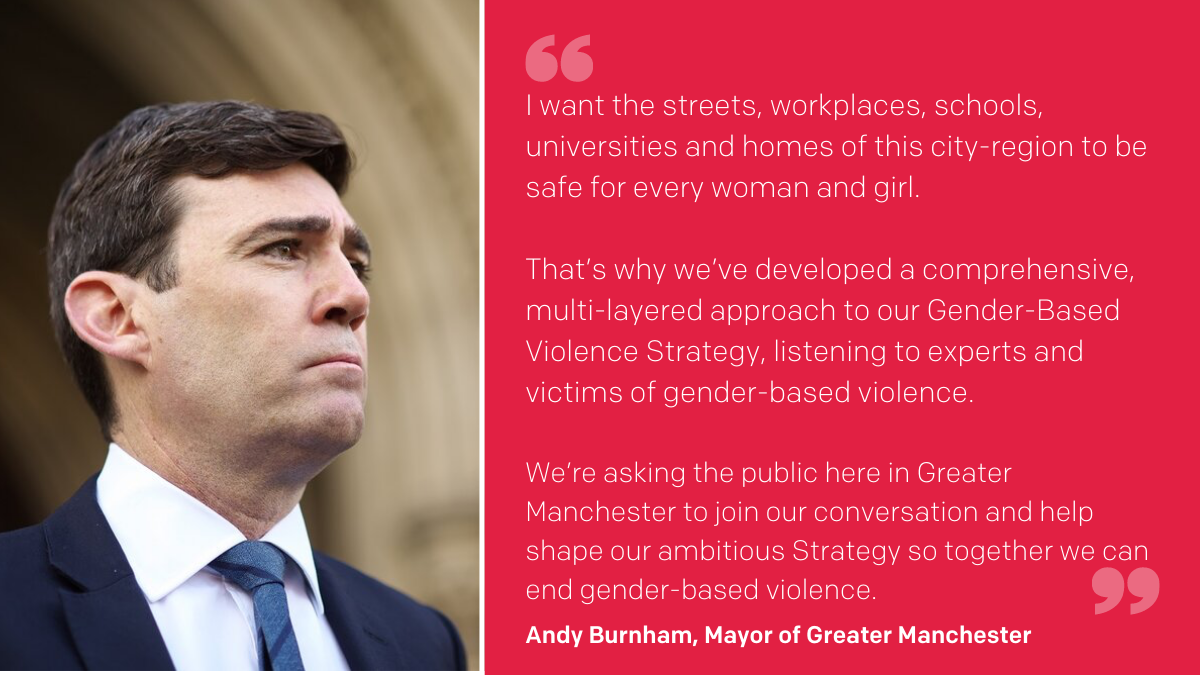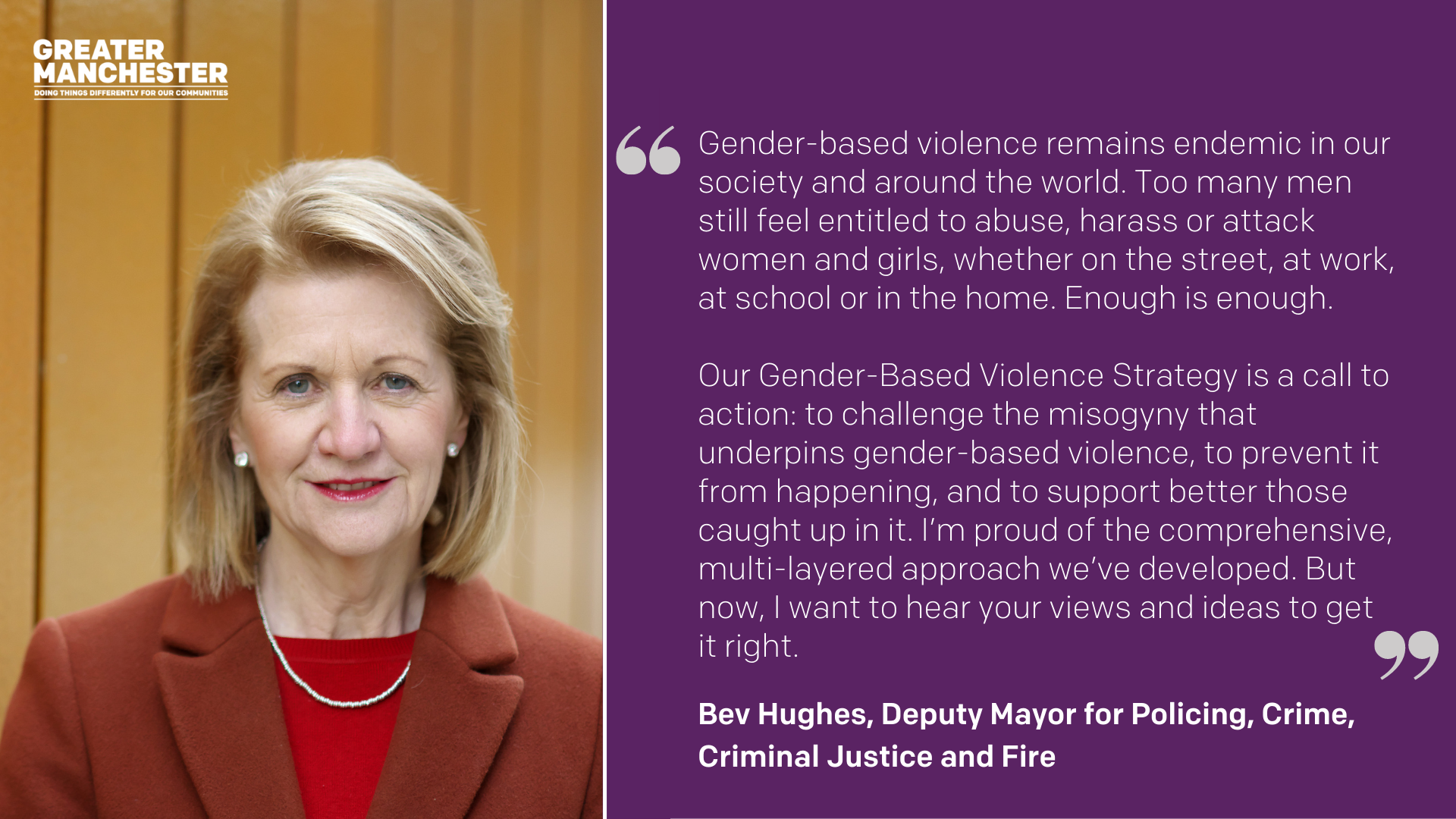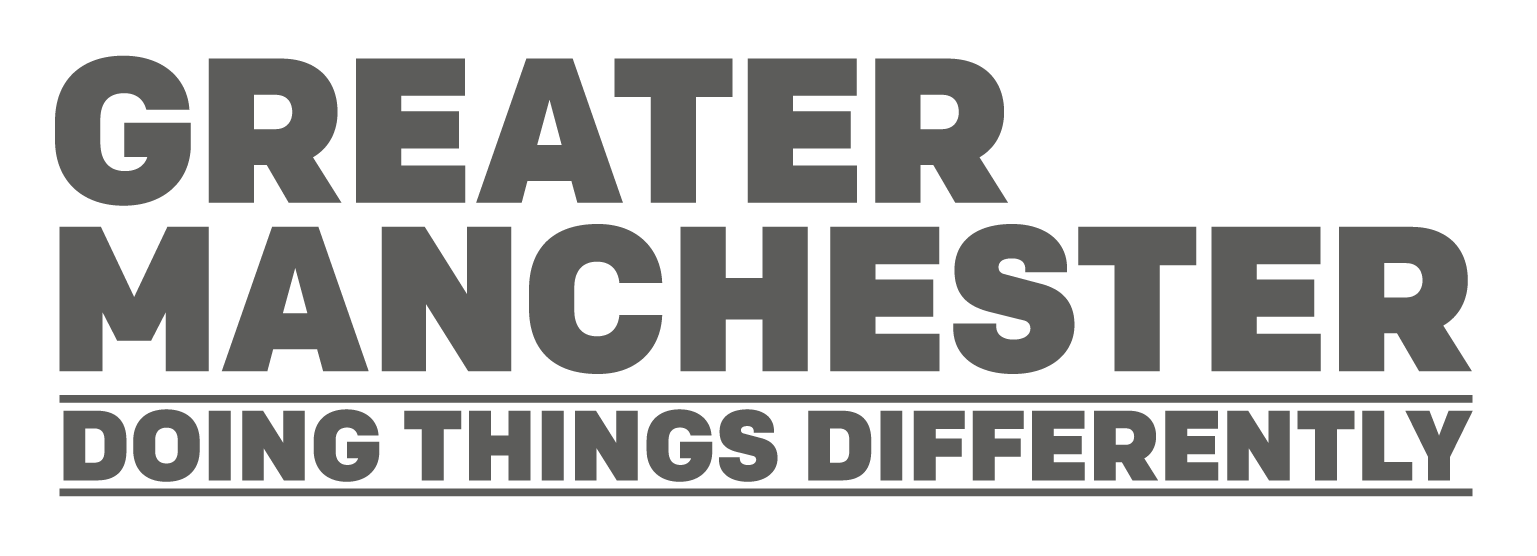Gender-Based Violence Strategy Consultation
Feedback updated 24 Sep 2021
We asked
We want Greater Manchester to be one of the best places in the world for people to grow, up, get on and grow old – and we are on a journey to achieve that. But the prevalence of gender-based violence represents a major barrier to achieving our ambition.
That’s why we have produced a Gender-Based Violence Strategy, which sets out a comprehensive, responsive programme of service delivery to enhance the safety of women and girls, while preventing gender-based violence from occurring in the first place and challenging the attitudes and inequalities that enable it.
We launched a public consultation on our Gender-Based Violence Strategy on 22nd June. The consultation consisted of a questionnaire asking questions in respect of each chapter, and closed on 1st August.
You said
The questionnaire was complemented by a number of focus groups and one-to-one interviews with victims and survivors of gender-based violence. 150 responses to the on-line questionnaire were received. Consultation also involved: the Greater Manchester Women and Girls Equality Panel; Disability Panel; Older People’s Network; and a sub-group of the Race Equality Panel.
The public consultation ran from 22 June to 1 August. The various results and themes from the consultation are detailed in our consultation report, published in September 2021, which can be found here: Gender-Based Violence Strategy - Response to Public Consultation (PDF, 242KB)
We did
Our final strategy was published on Friday 24 September 2021.
Alongside this, there will be a bespoke plan created to address how to effectively meet the needs of male victims and survivors. This will cover acts of violence, abuse and exploitation in which men or boys are the victims, and in which their gender, sexuality and/or intimate relationships are motivating or prevailing factors.
And there will also be a new Gender-Based Violence Board established, which will drive the implementation of the Strategy over the next 10 years.
Published responses
View submitted responses where consent has been given to publish the response.
Overview
We want Greater Manchester to be one of the best places in the world for people to grow, up, get on and grow old – and we are on a journey to achieve that. The prevalence of gender-based violence represents a major barrier to achieving our ambition.
Through the Gender-Based Violence Strategy, we aim to lead a comprehensive, responsive programme of service delivery that enhances the safety of women and girls, while preventing gender-based violence and challenging the attitudes and inequalities that enable it.


Greater Manchester is home to over 1.4 million women and girls and we continue to lead the way in striving for gender equality. However, there are a number of issues that disproportionately affect women and girls. Gender-based violence is one of the most pervasive violations of human rights in the world, with far reaching consequences for communities and society, as well as individuals and their families.
Abuse is deep rooted in gender inequality and subconscious bias, which has developed over generations, and occurs irrespective of class, ethnicity, faith, sexuality or where you live. Recent campaigns such as #MeToo and #TimesUp have given the issue more exposure. Very recently, the outpouring of emotion and testimonies following the tragic abduction and murder of Sarah Everard demonstrates all too clearly there remains much that we must do to tackle gender-based violence head on.
That’s why we have been developing a strategy for some time, which contains a series of commitments to end gender-based violence, and we want to know what you think about them.
- the pervasiveness of violence against women and girls
- that men and boys can also be victims too
- that men and boys are usually the primary perpetrators of this abuse at home and in public places
- Domestic homicides
- Domestic abuse and coercive control
- Rape and sexual assaults
- Stalking – on and offline
- Harassment – including in public and work place settings
- Sexual exploitation
- Romance frauds
- Traditional harmful practices (such as so-called honour-based crimes, female genital mutilation and forced marriage)
- Misogyny
- Trafficking and modern slavery
Why your views matter
In order to get this far in developing the Greater Manchester strategy to end gender- based violence, we have worked extensively with a range of people who support those affected by abuse, including the police, offender services, health services, education, safeguarding experts, and community and voluntary sector organisations. Most importantly, we have talked to many women who have personal experience of abuse.
In March 2021, we published the draft strategy online and invited people to share their views on it – in essence to get a sense check. We received 62 responses and in addition to altering the title and definition we have made several other amendments.
- Work with organisations that are experts in working with minoritised populations to improve assessment procedures so that social, emotional and economic needs are considered, as well as anticipate the risk of hate crimes
- Collect gender-based violence data and local demand for services to meet the needs all communities and demographic groups
- Introduce a cross-border protocol to establish co-operation across local authorities around housing, care and support for victims and survivors of domestic abuse
- The development of a Greater Manchester Advocacy Standards Framework will be compliant with the Violence Against Women and Girls Sector Shared Core Standards developed by Women’s Aid, Respect, Safe Lives, Imkaan and Rape Crisis England and Wales.
Now we want to find out what you think about the Greater Manchester Gender-Based Violence Strategy. Greater Manchester is a place where all voices are heard and where, working together, we can shape our future. Therefore, we would like to understand your views on how we can – together – deliver a strategy that will significantly reduce the risks and harms caused as a result of gender-based violence.
Our strategy will be delivered over a ten year period. We won’t be able to deliver all of our commitments at once and that is why we also want your views on what we should prioritise.
This survey will take approximately 10 minutes to complete. It is an anonymous survey and we ask that you do not include any personal information that could identify you or others.
If you are a victim or survivor and feel you need advice and support then please contact Greater Manchester Victims’ Services on 0161 200 1950 or visit www.gmvictims.org.uk.
Audiences
- Anyone from any background
Interests
- Combined Authority
- Mayor of Greater Manchester
- Deputy Mayor of Greater Manchester
- Equalities
- Violent crime
- Victims and witnesses of crime

Share
Share on Twitter Share on Facebook